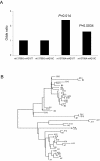mtDNA nt13708A variant increases the risk of multiple sclerosis
- PMID: 18270557
- PMCID: PMC2217590
- DOI: 10.1371/journal.pone.0001530
mtDNA nt13708A variant increases the risk of multiple sclerosis
Abstract
Background: Mitochondrial DNA (mtDNA) polymorphism is a possible factor contributing to the maternal parent-of-origin effect in multiple sclerosis (MS) susceptibility.
Methods and findings: In order to investigate the role of mtDNA variations in MS, we investigated six European MS case-control cohorts comprising >5,000 individuals. Three well matched cohorts were genotyped with seven common, potentially functional mtDNA single nucleotide polymorphisms (SNPs). A SNP, nt13708 G/A, was significantly associated with MS susceptibility in all three cohorts. The nt13708A allele was associated with an increased risk of MS (OR = 1.71, 95% CI 1.28-2.26, P = 0.0002). Subsequent sequencing of the mtDNA of 50 individuals revealed that the nt13708 itself, rather than SNPs linked to it, was responsible for the association. However, the association of nt13708 G/A with MS was not significant in MS cohorts which were not well case-control matched, indicating that the significance of association was affected by the population structure of controls.
Conclusions: Taken together, our finding identified the nt13708A variant as a susceptibility allele to MS, which could contribute to defining the role of the mitochondrial genome in MS pathogenesis.
Conflict of interest statement
Figures


References
-
- Wallace DC. Mitochondrial defects in neurodegenerative disease. Ment Retard Dev Disabil Res Rev. 2001;7:158–166. - PubMed
-
- Kalman B, Lublin FD, Alder H. Impairment of central and peripheral myelin in mitochondrial diseases. Mult Scler. 1997;2:267–278. - PubMed
-
- Howell N, Elson JL, Chinnery PF, Turnbull DM. mtDNA mutations and common neurodegenerative disorders. Trends Genet. 2005;21:583–586. - PubMed
-
- Shoffner JM, Brown MD, Torroni A, Lott MT, Cabell MF, et al. Mitochondrial DNA variants observed in Alzheimer disease and Parkinson disease patients. Genomics. 1993;17:171–184. - PubMed
Publication types
MeSH terms
Substances
LinkOut - more resources
Full Text Sources
Other Literature Sources
Medical

